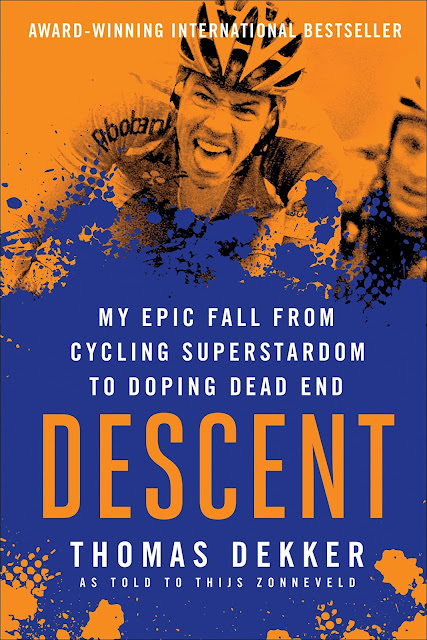Book review: "Descent" by Thomas Dekker and Thijs Zonneveld (2017)
Why cut corners when you can win fair and square?
-- Thomas Dekker, "Descent"
Mention professional cycling, or Tour de France, in a conversation with an individual farthest removed from the sport, and the first question that will inevitably come up goes on the lines of "But don't they all dope?" This is especially true since most headline grabbing stories focus on the illegal activities because such headlines sell. (Honestly, do you see any takers for the following news line in any non-cycling publication - "French cyclist displays tremendous grit by hanging on to the lead of the Tour de France, is appreciated by his rivals in the peloton!") The one abiding dictum of the world of reporting is that sensationalism sells, and sells mightily.
As such, we have seen quite a few riders come forward with their stories in print form, after having been banned by UCI and WADA, the governing bodies for cycling and anti-doping respectively. Whether their intention is to come clean of the weight on their conscience, or to cash in on the (negative) publicity before they fade away from public view, is something I will leave as judgement between them and their faith. For someone who loves biking for the sheer pleasure the act provides, and with no aspirations of medals or podium places, it is usually quite baffling as to why someone would put themselves through hell just to score a few points, when, as aptly demonstrated in the case of Lance Armstrong, this success can be humiliatingly stripped away at a future time? As such, I approached Thomas Dekker's memoir about his tumultuous time in the pro-peloton with a healthy dose of skepticism. What was this memoir going to tell me that I did not already know about doping - turns out, quite a lot.
Descent begins as any cycling memoir -- a kid in love with biking, encouraged by his middle-class parents as best as they can, finding success in the local circuits and catching the eye of a team scout/manager, and being invited to step into the world of cycling. It is a dream start that innumerable kids would wish for. But where Dekker's memoir diverges from Froome/Cavendish/Wiggins/Sagan/... is in the personality of the rider, and the era they were riding in. Dekker confesses from the start that his life was largely driven by a love of material things, and he went about collecting them by whatever means possible. Success as a cyclist in the biking-crazy society of Netherlands ensured that he was treated like a celebrity, and as such expected the world to revolve around him at all times. Dekker also entered the pro-peloton when doping was usually addressed as a "don't ask, don't tell" policy by the team management. If the riders were doping, then they were expected to be smart enough to not get caught.
What starts off on an upbeat note takes a very dark turn when Dekker is introduced to the world of blood doping, and eventually, EPOs. One expects that it would be but natural for him to dive into a world where his love of material things is not only celebrated, but encouraged in bombastic ways. In a stark reminder of how toxic machoism breeds more toxicity, he describes a world of rampant booze, sex, prostitution, and illegal performance-enhancers -- all moving towards the goal of showing off as the alpha male in the pack. Dekker's words should be mandatory reading for all aspiring cyclists, as a cautionary tale of how a fairy tale can swiftly turn into a protracted nightmare.
Descent does not pull any punches, and journalist Thijs Zonneveld, who penned Dekker's account, does a really excellent job of showing the collateral damage of choosing to cut corners to win at any cost. While the rider will themselves suffer irreplaceable damage to their reputation, what often goes unaccounted for is the damage to their personal lives. Relationships are broken, bonds and friendships are strained, and eventually, the cyclist must ask of themself in despair if all this was worth it?
At the end of it all, what I am left with is Dekker's quote at the top of this review - words from a much younger, innocent, and naive biker. Dekker's tale of self destruction needs to be looked into at the start, and not at the end of his descent into notoriety. Effort should be made to cultivate a culture of competition, without disproportional rewards. While riders who doped, or continue to do so, must be punished to the fullest extent, a better alternative is to not give rise to an environment where they are forced to make such choices. Thankfully, things have gotten better in the past few years but with the pendulum swinging hard in the other way. Hopefully, we can expect a cleaner future for the peloton in the years to come!
A good brisk read on a lazy afternoon.



Comments
Post a Comment